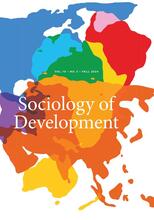
Abstract
Labor has stood as a central actor in the waves of contention against authoritarian forms of pro-market development in the Global South. In this paper, we analyze the local-level conditions that foster the mobilization of labor groups under such contexts. We study how municipal-level repressive and economic threats from authoritarian forms of pro-market development models generate labor protest. We focus on a wave of labor protest in El Salvador. In particular, we examine how subnational counts of labor mobilization events relate to variations in targeted repression and the labor flexibilization associated with transnational production. We use a unique dataset of labor mobilization, forced disappearances, and industrial ownership in El Salvador at the municipal level. More instances of disruptive labor protest emerged in those localities characterized by heightened political persecution and new workplace pressures from manufacturing operations financed by transnational capital. Based on threat models of contention, a more fine-grained approach at the subnational level helps explain how collective resistance builds into a full-blown wave of labor protest in authoritarian capitalist regimes.
